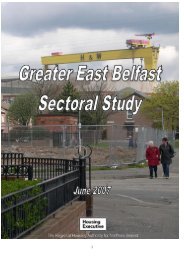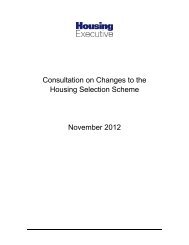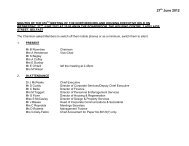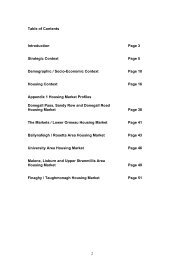Staff Code of Conduct - Northern Ireland Housing Executive
Staff Code of Conduct - Northern Ireland Housing Executive
Staff Code of Conduct - Northern Ireland Housing Executive
Create successful ePaper yourself
Turn your PDF publications into a flip-book with our unique Google optimized e-Paper software.
<strong>Staff</strong> <strong>Code</strong> <strong>of</strong> <strong>Conduct</strong><br />
CODE OF CONDUCT FOR HOUSING<br />
EXECUTIVE OFFICERS<br />
(THE STAFF CODE) 2012<br />
1
<strong>Staff</strong> <strong>Code</strong> <strong>of</strong> <strong>Conduct</strong><br />
DOCUMENT CONTROL SUMMARY<br />
Title<br />
Purpose <strong>of</strong> document<br />
Version No. 5.0<br />
Date <strong>of</strong> this draft 28 March 2012<br />
Author(s)<br />
Approved by<br />
<strong>Code</strong> <strong>of</strong> <strong>Conduct</strong> for <strong>Housing</strong> <strong>Executive</strong><br />
Officers (the <strong>Staff</strong> <strong>Code</strong>)<br />
This document sets out <strong>Housing</strong><br />
<strong>Executive</strong>’s <strong>Staff</strong> <strong>Code</strong> providing details<br />
on the behaviours, standards, and ethics<br />
to be adhered to by all Officers in<br />
exercising their duties<br />
Personnel Policy Unit<br />
<strong>Housing</strong> <strong>Executive</strong> Board<br />
Equality Screened 17 April 2012<br />
Next Review Date 01 April 2015<br />
2
<strong>Staff</strong> <strong>Code</strong> <strong>of</strong> <strong>Conduct</strong><br />
Contents<br />
1.0 INTRODUCTION 4<br />
2.0 PRINCIPLES AND VALUES 4<br />
3.0 ACCOUNTABILITY 6<br />
4.0 INTEGRITY 6<br />
5.0 OBJECTIVITY AND IMPARTIALITY 8<br />
6.0 CONFLICT OF INTEREST 9<br />
7.0 HOUSING RELATED MATTERS 10<br />
8.0 POLITICAL ACTIVITIES 12<br />
9.0 OUTSIDE COMMITMENTS 12<br />
10.0 MEMBERSHIP OF CLOSED ORGANISATIONS & SOCIETIES 13<br />
11.0 PROCUREMENT 13<br />
12.0 INVOLVEMENT IN THE MANAGEMENT, FUNDING, OR GOVERNANCE OF<br />
EXTERNAL BODIES 14<br />
13.0 TENANCIES 15<br />
14.0 BUSINESS RELATIONSHIPS WITH HOUSING ASSOCIATIONS AND OTHER<br />
SOCIAL LANDLORDS 15<br />
15.0 ACTING AS A HOUSING ADVISOR / SPOKESPERSON 16<br />
16.0 GIFTS AND HOSPITALITY 16<br />
17.0 SPONSORSHIP 17<br />
18.0 LEAVING HOUSING EXECUTIVE EMPLOYMENT 17<br />
19.0 FINANCIAL CONDUCT 18<br />
20.0 OFFENCES, ARRESTS AND CONVICTIONS 19<br />
21.0 PROPERTY AND EQUIPMENT 19<br />
22.0 RELATIONSHIPS WITH THE BOARD AND BOARD MEMBERS 20<br />
23.0 TRADE UNION ACTIVITIES 20<br />
24.0 DISCLOSURE OF INFORMATION 20<br />
25.0 WHISTLEBLOWING AND CONCERNS ABOUT IMPROPER CONDUCT 21<br />
Appendix 1 ‐ DESIGNATED MANAGERS UNDER THE STAFF CODE FOR HOUSING<br />
EXECUTIVE OFFICERS 24<br />
Appendix 2 ‐ DEFINITION OF RELEVANT FAMILY OR PERSONAL RELATIONSHIP 27<br />
Appendix 3 – LEGISLATION RELEVANT TO THE STAFF CODE 28<br />
Appendix 4 ‐ POLITICAL ACTIVITIES 29<br />
3
<strong>Staff</strong> <strong>Code</strong> <strong>of</strong> <strong>Conduct</strong><br />
1.0 INTRODUCTION<br />
1.1 This document sets out the <strong>Code</strong> <strong>of</strong> <strong>Conduct</strong> (the <strong>Staff</strong> <strong>Code</strong>) for <strong>Housing</strong><br />
<strong>Executive</strong> Officers and forms part <strong>of</strong> the contractual relationship between the<br />
<strong>Housing</strong> <strong>Executive</strong> and its Officers. It sets out the standards and behaviours<br />
required <strong>of</strong> all <strong>Housing</strong> <strong>Executive</strong> employees and workers, (permanent,<br />
temporary, or otherwise, and whether employed directly by the <strong>Housing</strong><br />
<strong>Executive</strong> or through an agency).<br />
1.2 The purpose <strong>of</strong> the <strong>Staff</strong> <strong>Code</strong> is to protect the <strong>Housing</strong> <strong>Executive</strong> and its<br />
Officers in carrying out its functions, to provide clear information on the<br />
conduct and behaviour that is required as an Officer <strong>of</strong> the <strong>Housing</strong><br />
<strong>Executive</strong>, and to encourage consistent standards throughout the<br />
Organisation.<br />
1.3 All Officers must familiarise themselves with the contents <strong>of</strong> the <strong>Staff</strong> <strong>Code</strong><br />
and act in accordance with the principles set out in it. Officers must ensure<br />
that they understand this document and if they have any doubts about any<br />
aspect they should in the first instance approach their Line Manager for<br />
clarification, and thereafter the Personnel Department.<br />
1.4 It is important to note and understand that any breach <strong>of</strong> the terms <strong>of</strong> the<br />
<strong>Staff</strong> <strong>Code</strong> will be dealt with in accordance with the provisions <strong>of</strong> the <strong>Housing</strong><br />
<strong>Executive</strong>'s Disciplinary Procedure. Serious or recurring breaches <strong>of</strong> the <strong>Staff</strong><br />
<strong>Code</strong> may be considered as Gross Misconduct under the <strong>Housing</strong> <strong>Executive</strong>’s<br />
Disciplinary Procedure with the potential to lead to dismissal.<br />
1.5 The <strong>Staff</strong> <strong>Code</strong> will kept under review and any subsequent revisions will be<br />
communicated to <strong>of</strong>ficers.<br />
2.0 PRINCIPLES AND VALUES<br />
2.1 This <strong>Staff</strong> <strong>Code</strong> builds on, and is in keeping with the <strong>Housing</strong> <strong>Executive</strong>’s Core<br />
Values, and the Seven Principles <strong>of</strong> Public Life as articulated by the<br />
Committee on Standards in Public Life. <strong>Housing</strong> <strong>Executive</strong> Officers must<br />
abide by and demonstrate commitment to these principles and values in the<br />
course <strong>of</strong> their employment.<br />
2.2 The Seven Principles <strong>of</strong> Public Life<br />
Selflessness – Holders <strong>of</strong> public <strong>of</strong>fice should take decisions solely in terms <strong>of</strong><br />
the public interest. They should not do so to gain financial or other material<br />
benefits for themselves, their family, or their friends.<br />
Integrity – Holders <strong>of</strong> public <strong>of</strong>fice should not place themselves under any<br />
financial or other obligation to outside individuals or organisations that might<br />
influence them in the performance <strong>of</strong> their <strong>of</strong>ficial duties.<br />
Objectivity – In carrying out public business, including making public<br />
appointments, or recommending individuals for rewards and benefits,<br />
holders <strong>of</strong> public <strong>of</strong>fice should make choices on merit.<br />
4
<strong>Staff</strong> <strong>Code</strong> <strong>of</strong> <strong>Conduct</strong><br />
Accountability – Holders <strong>of</strong> public <strong>of</strong>fice are accountable for their decisions<br />
and actions to the public and must submit themselves to whatever scrutiny is<br />
appropriate to their <strong>of</strong>fice.<br />
Openness – Holders <strong>of</strong> public <strong>of</strong>fice should be as open as possible about all<br />
the decisions and actions that they take. They should give reasons for their<br />
decisions and restrict information only when the wider public interest clearly<br />
demands.<br />
Honesty – Holders <strong>of</strong> public <strong>of</strong>fice have a duty to declare any private interests<br />
relating to their public duties and to take steps to resolve any conflicts arising<br />
in a way that protects the public interest.<br />
Leadership – Holders <strong>of</strong> public <strong>of</strong>fice should promote and support these<br />
principles by leadership and example.<br />
2.3 <strong>Housing</strong> <strong>Executive</strong> Core Values<br />
(i) Fairness and Equity ‐ Fairness and Equity are values that have remained<br />
at the heart <strong>of</strong> our organisation since it was established. We will<br />
measure the impact <strong>of</strong> our work on stakeholders. We will continue our<br />
processes <strong>of</strong> regular policy review, including employment issues and<br />
Equality Impact Assessment working along with our partners in the<br />
Consultative Forum.<br />
(ii) Integrity and honesty ‐ We will deal with people with respect and will<br />
work as an organisation that is principled and can be trusted.<br />
(iii) Openness and accountability ‐ We will work in ways that allow people to<br />
know why we make decisions. We will honour both the letter and the<br />
spirit <strong>of</strong> our Freedom <strong>of</strong> Information and Data Protection<br />
responsibilities.<br />
(iv) Care for the environment ‐ We have an Environmental Management<br />
Policy that aims to minimise any adverse effects our actions have on the<br />
environment. We will work with contractors and suppliers to minimise<br />
adverse impacts from things they do on our behalf.<br />
(v) Responsive to our customers ‐ We will use research to measure<br />
customer satisfaction and consult before taking major decisions that<br />
affect customers. We will listen to the views <strong>of</strong> customers through the<br />
<strong>Housing</strong> Community Network and Community Participation Compacts.<br />
(vi) Value for money ‐ We will deliver a first class service while seeking to<br />
minimise cost.<br />
(vii) Valuing and developing our staff ‐ Our staff are the key to all that we<br />
do. We will treat them fairly and make sure that they have all necessary<br />
support, training and recognition.<br />
(viii) Innovation and creativity ‐ We will develop, encourage and adapt<br />
imaginative approaches to housing issues in <strong>Northern</strong> <strong>Ireland</strong> working<br />
alongside partners, stakeholders and customers to ensure the best<br />
possible services.<br />
5
<strong>Staff</strong> <strong>Code</strong> <strong>of</strong> <strong>Conduct</strong><br />
3.0 ACCOUNTABILITY<br />
3.1 <strong>Housing</strong> <strong>Executive</strong> Officers should be aware:<br />
(i) <strong>of</strong> their accountability (through the management structure) to the Board<br />
(ii) <strong>of</strong> their accountability to each other and<br />
(iii) <strong>of</strong> their accountability to the customers <strong>of</strong> the <strong>Housing</strong> <strong>Executive</strong><br />
(iv) <strong>of</strong> the respective roles <strong>of</strong> the Department <strong>of</strong> Social Development<br />
("the Department") and the Board; and<br />
(v) that the Minister for Social Development is ultimately accountable<br />
through the <strong>Northern</strong> <strong>Ireland</strong> Assembly for the <strong>Housing</strong> <strong>Executive</strong>'s<br />
independence, effectiveness and efficiency.<br />
Officers <strong>of</strong> the <strong>Housing</strong> <strong>Executive</strong> must conduct themselves with integrity,<br />
impartiality and honesty, and must display the highest standards <strong>of</strong><br />
behaviour in all dealings with customers and colleagues. They must not<br />
deceive or knowingly mislead the Board, Government Departments,<br />
Ministers, the public, or their representatives.<br />
3.3 Officers are, at all times during their employment with the <strong>Housing</strong> <strong>Executive</strong>,<br />
expected to use their best endeavours to promote and protect the interests<br />
<strong>of</strong> the <strong>Housing</strong> <strong>Executive</strong> and must perform their duties and exercise powers<br />
vested in them in a manner which is consistent with the principles and core<br />
values set out at Section 2.0. They must avoid acting in a manner which is<br />
likely to be or is detrimental to the effective operation <strong>of</strong> its business,<br />
reputation or undermine public trust and confidence in the proper discharge<br />
<strong>of</strong> its functions.<br />
3.4 An Officer through whose proven negligence loss <strong>of</strong> public money has been<br />
caused, may be required to make good the loss in whole or in part.<br />
4.0 INTEGRITY<br />
4.1 Officers must not receive benefits <strong>of</strong> any kind from a third party which might<br />
reasonably be seen to compromise their personal judgement and integrity.<br />
Officers must not use their <strong>of</strong>ficial position to , directly or indirectly request,<br />
receive or agree to accept, a financial or other advantage for the improper<br />
performance <strong>of</strong> a relevant function or activity (within the meaning <strong>of</strong> the<br />
Bribery Act 2010) by them or by another person at their request, or with their<br />
assent or acquiescence. To do so would, in law, constitute an <strong>of</strong>fence relating<br />
to bribery.<br />
4.2 Officers must not request, agree to receive or accept a financial or other<br />
advantage from anyone who may benefit from work or funding provided by<br />
the <strong>Housing</strong> <strong>Executive</strong>. To do so would, in law, be an <strong>of</strong>fence relating to<br />
bribery.<br />
4.3 Officers must not only be honest in fact, but must also ensure that no act,<br />
omission or error leaves them open to any reasonable suspicion <strong>of</strong><br />
dishonesty.<br />
6
<strong>Staff</strong> <strong>Code</strong> <strong>of</strong> <strong>Conduct</strong><br />
4.4 Officers have a duty to discharge public functions reasonably and according<br />
to the law and to recognise ethical standards governing particular<br />
pr<strong>of</strong>essions. Officers must, by their acts and omissions, strive to avoid<br />
providing the basis for any successful legal challenge to the <strong>Housing</strong><br />
<strong>Executive</strong>.<br />
4.5 <strong>Housing</strong> <strong>Executive</strong> Officers are required to give the highest possible standard<br />
<strong>of</strong> service to the public and, where it is part <strong>of</strong> their duties, to provide<br />
impartial advice. Officers who deal with the affairs <strong>of</strong> the public must do so<br />
sympathetically, efficiently, promptly and without bias or maladministration.<br />
4.6 Officers must at all times act in a pr<strong>of</strong>essional manner to colleagues,<br />
employees and customers and be mindful <strong>of</strong> their actions, language and<br />
general conduct. In particular, Officers must not be verbally or physically<br />
abusive, make derogatory remarks, display <strong>of</strong>fensive written/pictorial<br />
materials, or make discriminatory statements. For the avoidance <strong>of</strong> doubt<br />
this also extends to the use <strong>of</strong> social media outside <strong>of</strong> work (see also PIB 471<br />
Social Media – Advice to <strong>Staff</strong>).<br />
4.7 Officers are also expected, without fear <strong>of</strong> recrimination, to bring to the<br />
attention <strong>of</strong> the Designated Manager (See Appendix 1) any deficiency or<br />
potential deficiency in the provision <strong>of</strong> service.<br />
4.8 Officers must declare to the Designated Manager (See Appendix 1) any nonfinancial<br />
interests (for instance membership <strong>of</strong> an organisation receiving<br />
grant aid from the <strong>Housing</strong> <strong>Executive</strong> or membership <strong>of</strong> an organisation or<br />
pressure group which may seek to influence the <strong>Housing</strong> <strong>Executive</strong>'s policies)<br />
if it may reasonably be perceived that any such interest could influence their<br />
judgement in favour <strong>of</strong> that organisation or group.<br />
4.9 Officers who have an interest, financial or non‐financial, must not involve<br />
themselves in any decision or allocation <strong>of</strong> <strong>Housing</strong> <strong>Executive</strong> services or<br />
resources from which they, or anyone with which they have a Relevant<br />
Family or Personal Relationship (see Appendix 2) might benefit, and must<br />
ensure that the matter is referred immediately to the Designated Manager<br />
(See Appendix 1).<br />
4.10 All Officers must abide by all <strong>Housing</strong> <strong>Executive</strong> rules, in relation to private<br />
interests and possible conflict with public duty, which apply generally, and/or<br />
which apply to their post in particular.<br />
4.11 All Officers must ensure that any possible conflicts <strong>of</strong> interest are identified at<br />
an early stage and that appropriate action is taken to resolve them.<br />
4.12 The <strong>Housing</strong> <strong>Executive</strong> is committed to the prevention <strong>of</strong> bribery in the<br />
exercise <strong>of</strong> its functions and has in place a number <strong>of</strong> policies and procedures<br />
designed to prevent the commission <strong>of</strong> <strong>of</strong>fences relating to bribery and at the<br />
same time provide protections for its Officers in the proper discharge <strong>of</strong> their<br />
duties. These include:<br />
(i) The <strong>Staff</strong> <strong>Code</strong><br />
(ii) Policy and Procedure on Gifts and Hospitality<br />
(iii) Financial Systems and Financial Control Procedures<br />
7
<strong>Staff</strong> <strong>Code</strong> <strong>of</strong> <strong>Conduct</strong><br />
(iv) Corporate Audit/Assurance Systems<br />
(v) Corporate Procurement Strategy<br />
(vi) Contract Management controls and Procedures<br />
(vii) Appointments and Promotions Procedure<br />
(viii) Whistleblowing Procedure<br />
(ix) Counter Fraud Strategy<br />
(x) Enforcement through the Disciplinary Procedure<br />
Involvement <strong>of</strong> an Officer in bribery will constitute a serious breach <strong>of</strong> the<br />
<strong>Staff</strong> <strong>Code</strong> which may be considered as Gross Misconduct under the <strong>Housing</strong><br />
<strong>Executive</strong>’s Disciplinary Procedure with the potential to lead to dismissal.<br />
5.0 OBJECTIVITY AND IMPARTIALITY<br />
5.1 The <strong>Housing</strong> <strong>Executive</strong> is determined to carry out all <strong>of</strong> its functions with<br />
objectivity and impartiality. An Officer must not engage in any act, omission<br />
or conduct which might lead members <strong>of</strong> the general public to reasonably<br />
doubt that <strong>of</strong>ficer’s ability or willingness to impartially discharge his/her<br />
<strong>of</strong>ficial duties.<br />
5.2 Where Officers are required to provide information and advice, or set out<br />
options or facts, they must do so accurately on the basis <strong>of</strong> evidence.<br />
5.3 Officers must deal honestly with all cases that come before them and through<br />
their actions or omissions they must not improperly deny any person <strong>of</strong> a<br />
legal right or entitlement.<br />
5.4 All members <strong>of</strong> the community, customers, and Officers have a right to be<br />
treated with fairness and equity. In this regard Officers must:<br />
Be aware <strong>of</strong> and act in accordance with their obligations under relevant employment<br />
law and the <strong>Housing</strong> <strong>Executive</strong>s’ employment, equal opportunities, and equality<br />
policies.<br />
Not take discriminatory action or decisions or encourage fellow employees or<br />
stakeholders <strong>of</strong> the <strong>Housing</strong> <strong>Executive</strong> to take discriminatory action or decisions<br />
Some <strong>of</strong> the relevant legislation is listed at Appendix 3 <strong>of</strong> the <strong>Staff</strong> <strong>Code</strong>.<br />
5.5 Whilst the <strong>Housing</strong> <strong>Executive</strong> recognises and respects the rights <strong>of</strong> all Officers<br />
to hold personal or political opinions, Officers must ensure that the<br />
expression <strong>of</strong> those opinions does not constitute a conflict <strong>of</strong> interest in<br />
relation to their role within the <strong>Housing</strong> <strong>Executive</strong>, nor has the potential to<br />
bring the <strong>Housing</strong> <strong>Executive</strong> into disrepute. For the avoidance <strong>of</strong> doubt this<br />
also extends to the use <strong>of</strong> social media outside <strong>of</strong> work (see also PIB 471<br />
Social Media – Advice to <strong>Staff</strong>).<br />
5.6 All contacts with the media should generally be handled through the <strong>Housing</strong><br />
<strong>Executive</strong>’s Information Department. In that context an Officer must not<br />
make any public statements, or publish or broadcast any material, whether or<br />
not it involves the disclosure <strong>of</strong> <strong>of</strong>ficial information, or draws upon<br />
8
<strong>Staff</strong> <strong>Code</strong> <strong>of</strong> <strong>Conduct</strong><br />
experience gained in their <strong>of</strong>ficial capacity, without the prior approval <strong>of</strong> the<br />
Designated Manager (see Appendix 1)<br />
5.7 Officers involved in making staff appointments must at all times act in<br />
accordance with <strong>Housing</strong> <strong>Executive</strong>’s Appointments and Promotions<br />
Procedure and must act with strict impartiality. Officers must not be involved<br />
in decisions in relation to appointments, promotions, discipline, or pay<br />
adjustments for any other individual where a Relevant Family or Personal<br />
Relationship is deemed to exist (see Appendix 2).<br />
5.8 Officers will not be employed together where a Family Relationship is<br />
deemed to exist (see Appendix 2) in any situation where one would be<br />
responsible for managing, auditing or authorising the work <strong>of</strong> the other or<br />
where the responsibility includes the handling <strong>of</strong> cash. Officers should be<br />
aware <strong>of</strong> the potential for actual or perceived conflict <strong>of</strong> interest, or unfair<br />
advantage where a close personal relationship develops in the work place<br />
from the overlap <strong>of</strong> a personal and pr<strong>of</strong>essional relationship. In that<br />
situation, it is the responsibility <strong>of</strong> the Officers concerned to make it known<br />
to the Designated Manager (see Appendix 1). The <strong>Housing</strong> <strong>Executive</strong> reserves<br />
the right to transfer one or both <strong>of</strong> the Officers to suitable alternative posts<br />
and/or places <strong>of</strong> work where it considers this to be appropriate, reasonable<br />
and proportionate.<br />
5.9 Officers who are uncertain about whether they should take action regarding<br />
a personal relationship are invited to seek guidance in confidence, from the<br />
Personnel Manager. Where any personal relationship as defined within this<br />
<strong>Staff</strong> <strong>Code</strong> (see Appendix 2), is not declared and results in a conflict <strong>of</strong><br />
interest or an unfair advantage or disadvantage to either <strong>of</strong> the parties to the<br />
relationship, this will be considered a breach <strong>of</strong> this <strong>Staff</strong> <strong>Code</strong>.<br />
6.0 CONFLICT OF INTEREST<br />
6.1 Officers must not subordinate their duty to the <strong>Housing</strong> <strong>Executive</strong> to their<br />
private interests or put themselves in a position where duty to the <strong>Housing</strong><br />
<strong>Executive</strong> and private interests conflict.<br />
6.2 Private interests must not be such as might lead members <strong>of</strong> the public<br />
reasonably to perceive impropriety or partiality.<br />
6.3 In carrying out their duties Officers must ensure that private interests do not<br />
influence their decisions or actions in any way. Officers must not use their<br />
position, or the <strong>Housing</strong> <strong>Executive</strong>’s activities to obtain a personal or business<br />
financial gain or some other advantage either for themselves or for others<br />
with whom a Relevant Family or Personal Relationship (see Appendix 2) is<br />
deemed to exist.<br />
6.4 Responsibility is placed on every Officer to declare to the Designated<br />
Manager (as listed at Appendix 1) any potential conflict <strong>of</strong> interest in which<br />
he/she may be involved. Officers must satisfy themselves in respect <strong>of</strong> the<br />
content <strong>of</strong> the <strong>Staff</strong> <strong>Code</strong> and associated <strong>Housing</strong> <strong>Executive</strong> policies and<br />
determine whether or not a declaration must be made. In considering the<br />
need to declare an interest Officers must be mindful <strong>of</strong> whether or not it may<br />
9
<strong>Staff</strong> <strong>Code</strong> <strong>of</strong> <strong>Conduct</strong><br />
reasonably be perceived that any such interest could influence their<br />
judgement.<br />
6.5 Officers are required to keep their interests under review and consider<br />
whether or not a declaration must be made as those interests and/or their<br />
role within the <strong>Housing</strong> <strong>Executive</strong> change or develop over time.<br />
6.6 Officers are responsible on an ongoing basis for updating information in<br />
relation to their interests on the <strong>Staff</strong> Declaration Register and will be<br />
required to review the information recorded on the Register on an annual<br />
basis. In so doing Officers are also required to record that they have no<br />
interests to declare where this is the case. Failure to properly maintain the<br />
<strong>Staff</strong> Declaration Register will in itself constitute a breach <strong>of</strong> the <strong>Staff</strong> <strong>Code</strong>.<br />
6.7 Where there is uncertainty on the part <strong>of</strong> the Officer a declaration must be<br />
made to avoid the potential for any later inference that he/she knowingly<br />
failed to do so.<br />
6.8 It is the role <strong>of</strong> the Designated Manager (see Appendix 1) to determine the<br />
extent <strong>of</strong> any conflict or potential conflict <strong>of</strong> interest based on the declaration<br />
made and to advise on arrangements that can be put in place to manage or<br />
mitigate against it including, where necessary, the need to inform other<br />
<strong>Housing</strong> <strong>Executive</strong> Managers.<br />
Particular attention is drawn to the examples <strong>of</strong> situations where potential<br />
conflicts <strong>of</strong> interest can occur as set out at Section 7.0 to 18.0 <strong>of</strong> the <strong>Staff</strong><br />
<strong>Code</strong>.<br />
7.0 HOUSING RELATED MATTERS<br />
7.1 Where any casework, involves an Officer personally, or involves anyone with<br />
whom a Relevant Family or Personal Relationship exists (see Appendix 2)<br />
then the case must be referred to the Designated Manager for a decision as<br />
to how and by whom it should be handled (see Appendix 1). This includes<br />
but is not limited to such matters as:<br />
(i) allocation,<br />
(ii) transfer,<br />
(iii) exchange,<br />
(iv) home loan,<br />
(v) house sale or purchase,<br />
(vi) land sale or purchase,<br />
(vii) home adaptation,<br />
(viii) major improvements to an <strong>Housing</strong> <strong>Executive</strong> dwelling,<br />
(ix) grants,<br />
(x) housing benefit.<br />
(xi) Scheme for the Purchase <strong>of</strong> Evacuated Dwelling (SPED) Acquisitions<br />
(xii)HMOs<br />
10
<strong>Staff</strong> <strong>Code</strong> <strong>of</strong> <strong>Conduct</strong><br />
(xiii) Group Repair<br />
7.2 No Officer shall take part in handling any issue in relation to any housing<br />
association or other social landlord if both <strong>of</strong> the following conditions exist:<br />
(i) Any <strong>of</strong> the following are concerned in the management or governance <strong>of</strong><br />
the relevant association or other social landlord:<br />
(a) The Officer<br />
(b) Anybody for whom a Relevant Family or Personal Relationship is<br />
deemed to exist with the Officer (see Appendix 2).<br />
(ii) (Possible <strong>Housing</strong> <strong>Executive</strong> actions/omissions in connection with the<br />
issue may result in substantial advantage or detriment to the relevant<br />
association or other social landlord.<br />
7.3 Where an Officer or anybody with whom the Officer has a Relevant Family or<br />
Personal Relationship (see Appendix 2) is concerned in the management or<br />
governance <strong>of</strong>, or has a business interest in, either<br />
(i) a current <strong>Housing</strong> <strong>Executive</strong> contractor, supplier or service provider, or<br />
(ii) a contractor, supplier or service provider that is tendering for <strong>Housing</strong><br />
<strong>Executive</strong> business,<br />
then the Officer must refer the matter to the Designated Manager to advise<br />
on arrangements that can be put in place to manage or mitigate against the<br />
potential for a conflict <strong>of</strong> interest (see Appendix 1).<br />
7.4 In any case falling within the circumstances mentioned in paragraphs 7.1, 7.2,<br />
or 7.3 above, the Officer concerned must report the facts in writing to the<br />
Designated Manager (see Appendix 1) and follow that Manager's directions in<br />
relation to alternative arrangements for handling the matter.<br />
7.5 An Officer must not, without the prior written consent <strong>of</strong> the Designated<br />
Manager (see Appendix 1), carry out work as an agent, draughtsman,<br />
architect, quantity surveyor, or site supervisor for a grant applicant.<br />
7.6 An Officer must promptly inform the Designated Manager in writing <strong>of</strong> the<br />
existence <strong>of</strong> any <strong>of</strong> the following two situations:<br />
(i) If a Relevant Family or Personal Relationship is deemed to exist (see<br />
Appendix 2) between the Officer and a person who works as an agent<br />
(draughtsman or architect) for a grant applicant.<br />
(ii) If a Relevant Family or Personal Relationship is deemed to exist (see<br />
Appendix 2) between the Officer and a person who is the owner or<br />
senior manager <strong>of</strong> a construction firm which carries out work for a grant<br />
applicant.<br />
7.7 The <strong>Housing</strong> <strong>Executive</strong> has an obligation to comply with the statutory house<br />
allocation scheme ("the Scheme"); if any <strong>of</strong>ficer, in the course <strong>of</strong> his/ her<br />
duties, by act and/or omission, fails to comply with the terms <strong>of</strong> the Scheme,<br />
this will constitute a serious breach <strong>of</strong> the <strong>Staff</strong> <strong>Code</strong> which may be<br />
considered as Gross Misconduct under the <strong>Housing</strong> <strong>Executive</strong>’s Disciplinary<br />
Procedure with the potential to lead to dismissal.<br />
11
<strong>Staff</strong> <strong>Code</strong> <strong>of</strong> <strong>Conduct</strong><br />
8.0 POLITICAL ACTIVITIES<br />
8.1 It is essential that all <strong>Housing</strong> <strong>Executive</strong> stakeholders and the public should<br />
have confidence that the personal views <strong>of</strong> <strong>Housing</strong> <strong>Executive</strong> Officers do not<br />
improperly influence the discharge <strong>of</strong> their duties. The purpose <strong>of</strong> the rules<br />
governing political activities by <strong>Housing</strong> <strong>Executive</strong> Officers is to allow the<br />
greatest possible freedom to participate in public affairs without infringing<br />
this fundamental principle. The rules are concerned with political activities<br />
that are liable to give public expression to political views, rather than<br />
privately‐held beliefs and opinions. The rules are detailed in Appendix 4.<br />
9.0 OUTSIDE COMMITMENTS<br />
9.1 Officers must not engage in any external business, any external employment,<br />
or any external appointment, without the prior written consent <strong>of</strong> the<br />
Designated Manager (see Appendix 1) if any <strong>of</strong> the following circumstances<br />
apply to the business, employment or appointment:<br />
(i) Engagement in it would, in the view <strong>of</strong> the <strong>Housing</strong> <strong>Executive</strong>, react<br />
detrimentally to the <strong>Housing</strong> <strong>Executive</strong>'s interests, or<br />
(ii) Engagement in it would, in the view <strong>of</strong> the <strong>Housing</strong> <strong>Executive</strong>, put the<br />
Officer into a position where duty to the <strong>Housing</strong> <strong>Executive</strong> and external<br />
interests will conflict, or are likely to conflict, or<br />
(iii) Engagement in it would, in any way, in the view <strong>of</strong> the <strong>Housing</strong><br />
<strong>Executive</strong>, weaken public confidence in the impartiality <strong>of</strong> the <strong>Housing</strong><br />
<strong>Executive</strong> or in the effective conduct <strong>of</strong> the <strong>Housing</strong> <strong>Executive</strong>'s work.<br />
9.2 For the avoidance <strong>of</strong> doubt and for the purposes <strong>of</strong> paragraph 9.1 above<br />
engagement in any external business, employment, or appointment will be<br />
deemed to react detrimentally to the <strong>Housing</strong> <strong>Executive</strong>'s interests where it<br />
may give rise to or contribute to an <strong>of</strong>ficer’s sickness absence, or<br />
deterioration in performance.<br />
9.3 If an Officer abuses the sickness scheme or is absent on account <strong>of</strong> sickness<br />
due or attributable to deliberate conduct prejudicial to recovery or the<br />
Officer’s own misconduct or neglect or active participation in pr<strong>of</strong>essional<br />
sport or injury while working in the Officer’s own time on their own account<br />
for private gain or for another employer sick pay may be suspended.<br />
9.4 Officers must follow any rules <strong>of</strong> the <strong>Housing</strong> <strong>Executive</strong> on the ownership <strong>of</strong><br />
intellectual property or copyright created during their employment with the<br />
<strong>Housing</strong> <strong>Executive</strong> (see also Section 21.0 below).<br />
9.5 Officers must not carry out any work which may ultimately come before<br />
<strong>Housing</strong> <strong>Executive</strong> for approval or decision.<br />
9.6 No external business may be conducted on the <strong>Housing</strong> <strong>Executive</strong>’s premises<br />
or make use <strong>of</strong> <strong>Housing</strong> <strong>Executive</strong> resources or property.<br />
12
<strong>Staff</strong> <strong>Code</strong> <strong>of</strong> <strong>Conduct</strong><br />
10.0 MEMBERSHIP OF CLOSED ORGANISATIONS<br />
& SOCIETIES<br />
10.1 For the purposes <strong>of</strong> the <strong>Staff</strong> <strong>Code</strong>, Officers must declare to the Designated<br />
Manager (see Appendix 1) membership <strong>of</strong> an organisation that is not<br />
generally open to the public without formal membership which meets the<br />
following definition :‐<br />
Any lodge, chapter, society, trust or regular gathering or meeting which:<br />
(i) is not open to members <strong>of</strong> the public who are not members <strong>of</strong> that<br />
lodge, chapter, society or trust<br />
(ii) includes in the grant <strong>of</strong> membership an obligation on the part <strong>of</strong> the<br />
member a requirement to make a commitment (whether by oath or<br />
otherwise) <strong>of</strong> allegiance to the lodge, chapter, society, gathering or<br />
meeting; and<br />
(iii) includes whether initially or subsequently, a commitment (whether by<br />
oath or otherwise) <strong>of</strong> secrecy about the rules, membership or conduct<br />
<strong>of</strong> the lodge, chapter, society, trust, gathering or meeting.<br />
A lodge, chapter, society, trust, gathering or meeting as defined above,<br />
should not be regarded as a secret society if it forms part <strong>of</strong> the activity <strong>of</strong> a<br />
generally recognised religion.1<br />
11.0 PROCUREMENT<br />
11.1 All procurements within the <strong>Housing</strong> <strong>Executive</strong> must be taken forward in<br />
accordance with the Board’s Standing Orders and the Corporate Procurement<br />
Strategy, copies <strong>of</strong> which are available on request or published on the staff<br />
intranet). In accordance with these documents all procurements must be<br />
carried out by the Corporate Procurement Unit.<br />
11.2 Officers involved in the procurement process, that is Officers in the Corporate<br />
Procurement Unit or who sit on evaluation panels, must be clear on the<br />
separation <strong>of</strong> client and contractor roles within the <strong>Housing</strong> <strong>Executive</strong>.<br />
Officers who have both a client and contractor responsibility must be aware<br />
<strong>of</strong> the need for accountability and openness.<br />
11.3 Officers must exercise fairness, openness, transparency and impartiality<br />
when dealing with customers, suppliers, contractors and sub‐contractors.<br />
This includes all relevant discussions and correspondence. Officers must also<br />
be alert to any potential conflicts <strong>of</strong> interest that may exist between them<br />
and the supply base with which they are interacting and must advise the<br />
Designated Manager in accordance with Paras 11.5 to 11.7 below.<br />
11.4 Officers who are privy to confidential information relating to any tendering<br />
process must not disclose that information to any unauthorised party or<br />
organisation.<br />
1 As defined by the Local Government Management Board Working Group<br />
13
<strong>Staff</strong> <strong>Code</strong> <strong>of</strong> <strong>Conduct</strong><br />
11.5 Officers must ensure that no special favour is shown to current or recent<br />
former <strong>of</strong>ficers, or to anyone who has a Relevant Family or Personal<br />
Relationship with such an individual (see Appendix 2), or any person who is<br />
deemed to have a financial relationship with such an individual, in connection<br />
with the procurement <strong>of</strong> any goods, building work or other services.<br />
11.6 All relationships with current contractors or potential contractors (including<br />
contractors, suppliers and service‐providers) must be made known to the<br />
Designated Manager (see Appendix 1), if it may reasonably be perceived that<br />
any such relationship could influence their (the Officer’s) judgement. Orders<br />
and contracts must be in accordance with the <strong>Housing</strong> <strong>Executive</strong>s<br />
procurement procedures and no special favour must be shown in the<br />
tendering process to any businesses or potential suppliers particularly those<br />
run by persons where a Relevant Family or Personal Relationship is deemed<br />
to exist (see Appendix 2).<br />
11.7 Officers who deal with, engage, or supervise contractors, suppliers, serviceproviders,<br />
consultants or voluntary groups, with whom a Relevant Family or<br />
Personal Relationship has previously been or is currently deemed to exist (see<br />
Appendix 2), must declare that relationship to the Designated Manager (see<br />
Appendix 1) and thereafter act in accordance with that Manager's advice and<br />
directions.<br />
12.0 INVOLVEMENT IN THE MANAGEMENT,<br />
FUNDING, OR GOVERNANCE OF EXTERNAL<br />
BODIES<br />
12.1 If an Officer is appointed to represent the <strong>Housing</strong> <strong>Executive</strong> by serving on<br />
the Committee <strong>of</strong> Management <strong>of</strong> any external body, or is considering<br />
involvement with any external body, that Officer must observe any<br />
conditions imposed by the <strong>Housing</strong> <strong>Executive</strong> in relation to any such<br />
appointment.<br />
12.2 Officers must not serve on the Committee <strong>of</strong> Management, or involve<br />
themselves in the management <strong>of</strong>, any registered <strong>Housing</strong> Association, or <strong>of</strong><br />
any Specified Body in their private capacity without the prior written<br />
permission <strong>of</strong> the <strong>Housing</strong> <strong>Executive</strong>.<br />
12.3 For the Purposes <strong>of</strong> this Section, a body, authority, group or organisation is a<br />
“Specified Body” if both <strong>of</strong> the following requirements exist:<br />
(i) it is not a public body, and<br />
(ii) engagement in it would, in the reasonable opinion <strong>of</strong> the <strong>Housing</strong><br />
<strong>Executive</strong>;<br />
(a) put the Officer into a position where duty to the <strong>Housing</strong><br />
<strong>Executive</strong> and external interests will conflict, or are likely to<br />
conflict, or<br />
14
<strong>Staff</strong> <strong>Code</strong> <strong>of</strong> <strong>Conduct</strong><br />
(b) weaken public confidence in the impartiality <strong>of</strong> the <strong>Housing</strong><br />
<strong>Executive</strong> or in the effective conduct <strong>of</strong> the <strong>Housing</strong> <strong>Executive</strong>‘s<br />
work, or<br />
(c) apparently provide the Specified Body with an opportunity to have<br />
access to confidential information not otherwise available to it.<br />
12.4 The <strong>Housing</strong> <strong>Executive</strong>’s Director <strong>of</strong> Personnel (or another individual<br />
nominated by him/her) will give guidance on the question <strong>of</strong> whether or not<br />
the particular body, authority, group or organisation is, or is not, a “Specified<br />
Body”. In the event <strong>of</strong> the issue becoming material, Officers are advised to<br />
seek such guidance.<br />
12.5 Where <strong>Housing</strong> <strong>Executive</strong> permission, in respect <strong>of</strong> participation in the<br />
management or governance <strong>of</strong> any body, as set out above, is required:<br />
(i) Any such permission may be subject to the Officer concerned agreeing<br />
to certain pre‐conditions <strong>of</strong> membership.<br />
(ii) Any permission granted will be for an initial period <strong>of</strong> one year, but can<br />
be terminated at any earlier stage if the <strong>Housing</strong> <strong>Executive</strong> in its<br />
discretion thinks fit.<br />
(iii) Any such permission will be renewable at yearly intervals but, again, can<br />
be withdrawn at any earlier stage if the <strong>Housing</strong> <strong>Executive</strong> thinks fit.<br />
Further guidance on the <strong>Housing</strong> <strong>Executive</strong>’s policy and procedure in relation<br />
to involvement in external bodies can be found in the Manual on<br />
Representation and Funding Outside Bodies.<br />
13.0 TENANCIES<br />
13.1 Officers must inform the Designated Manager (see Appendix 1) promptly if<br />
upon or after appointment to <strong>Housing</strong> <strong>Executive</strong> they are a tenant <strong>of</strong> the<br />
<strong>Housing</strong> <strong>Executive</strong>, a <strong>Housing</strong> Association, or any other social landlord.<br />
13.2 Officers who are also tenants <strong>of</strong> the <strong>Housing</strong> <strong>Executive</strong> enjoy the same rights<br />
and protections afforded to all <strong>Housing</strong> <strong>Executive</strong> tenants. Officers should be<br />
aware that like all <strong>Housing</strong> <strong>Executive</strong> tenants they are obliged to comply with<br />
the <strong>Housing</strong> <strong>Executive</strong>s’ terms and conditions <strong>of</strong> tenancy and they are<br />
expected to conduct their tenancy in such a way as does not discredit the<br />
<strong>Housing</strong> <strong>Executive</strong>. For example, breaches <strong>of</strong> the tenancy agreement resulting<br />
in the accrual <strong>of</strong> rent arrears or behaviour causing a nuisance or annoyance<br />
to neighbours.<br />
14.0 BUSINESS RELATIONSHIPS WITH HOUSING<br />
ASSOCIATIONS AND OTHER SOCIAL<br />
LANDLORDS<br />
14.1 An Officer must not enter into any business relationship (whether as lessor or<br />
otherwise) with any housing association or other social landlord, except with<br />
the prior written permission <strong>of</strong> the Designated Manager (see Appendix 1).<br />
15
<strong>Staff</strong> <strong>Code</strong> <strong>of</strong> <strong>Conduct</strong><br />
15.0 ACTING AS A HOUSING ADVISOR /<br />
SPOKESPERSON<br />
15.1 No Officer may act as housing adviser to or a housing spokesperson for, any<br />
tenants association, residents association, quasi‐political body or pressure<br />
group.<br />
16.0 GIFTS AND HOSPITALITY<br />
16.1 Officers must comply with all <strong>Housing</strong> <strong>Executive</strong> rules, in relation to the<br />
acceptance <strong>of</strong> personal sponsorship, gifts and/or hospitality, which apply<br />
generally or which apply in particular to their post. While no malice may be<br />
intended on the part <strong>of</strong> the person <strong>of</strong>fering gifts or hospitality Officers must<br />
recognise the risks that may arise <strong>of</strong> conflict, real or perceived, being<br />
construed by their acceptance and at all times protect both the <strong>Housing</strong><br />
<strong>Executive</strong>’s and their own integrity.<br />
16.2 Officers must not accept significant personal gifts from current or potential<br />
contractors, suppliers, or service‐providers, or from members <strong>of</strong> the public.<br />
Isolated gifts <strong>of</strong> token value such as pens, diaries, etc. can be considered to<br />
be insignificant.<br />
16.3 Officers must only accept <strong>of</strong>fers <strong>of</strong> hospitality if there is a genuine need to<br />
impart information or represent the <strong>Housing</strong> <strong>Executive</strong> in the community.<br />
Offers to attend purely social or sporting functions must be accepted only<br />
when they are part <strong>of</strong> the life <strong>of</strong> the community or where the <strong>Housing</strong><br />
<strong>Executive</strong> should be seen to be represented. The acceptance <strong>of</strong> any<br />
hospitality must be properly authorised and all <strong>of</strong>fers must be recorded on<br />
the <strong>Staff</strong> Interest Register in accordance with relevant <strong>Housing</strong> <strong>Executive</strong><br />
rules.<br />
16.4 The handling <strong>of</strong> <strong>of</strong>fers <strong>of</strong> hospitality requires Officers to exercise careful<br />
judgement but the basic principle must be that where there is any risk that<br />
the acceptance <strong>of</strong> an <strong>of</strong>fer <strong>of</strong> hospitality could reasonably be perceived as<br />
influencing an Officer in the exercise <strong>of</strong> his/her <strong>of</strong>ficial duties, it must be<br />
refused. All <strong>of</strong>fers <strong>of</strong> hospitality whether accepted or not must be recorded<br />
on the <strong>Staff</strong> Interest Register.<br />
16.5 When considering whether or not to accept authorised hospitality (see<br />
paragraph 16.3), Officers must also be particularly sensitive as to its timing in<br />
relation to decisions which the <strong>Housing</strong> <strong>Executive</strong> may be taking, if those<br />
decisions are likely to affect those providing the hospitality.<br />
16.6 Acceptance by Officers <strong>of</strong> hospitality through attendance at relevant<br />
conferences and courses is acceptable if any <strong>of</strong> the following conditions<br />
apply:<br />
(i) The Designated Manager consents in advance (see Appendix 1).<br />
(ii) The Designated Manager is satisfied that any <strong>of</strong>ficial decisions are not<br />
compromised.<br />
16
<strong>Staff</strong> <strong>Code</strong> <strong>of</strong> <strong>Conduct</strong><br />
16.7 Where a visit is necessary, to inspect equipment for example, it will usually<br />
be appropriate for the <strong>Housing</strong> <strong>Executive</strong> to meet the cost <strong>of</strong> the visit in order<br />
to avoid jeopardising the integrity <strong>of</strong> the <strong>Housing</strong> <strong>Executive</strong> in subsequent<br />
purchasing decisions.<br />
17.0 SPONSORSHIP<br />
17.1 Where an outside organisation wishes to sponsor, or is seeking to sponsor, a<br />
<strong>Housing</strong> <strong>Executive</strong> activity (whether by invitation, tender, negotiation or<br />
voluntarily) the basic conventions, concerning acceptance by Officers <strong>of</strong> gifts<br />
or hospitality apply to such <strong>of</strong>ficers. Particular care must be taken when<br />
dealing with current or potential contractors, suppliers or service‐providers.<br />
17.2 Where the <strong>Housing</strong> <strong>Executive</strong> wishes to sponsor an event or service, an<br />
Officer or anyone with whom a Relevant Family or Personal Relationship is<br />
deemed to exist (see Appendix 2) must not benefit from such sponsorship in<br />
a direct way without there being full disclosure to the Designated Manager<br />
(see Appendix 1) <strong>of</strong> any such interest.<br />
17.3 Similarly, where the <strong>Housing</strong> <strong>Executive</strong> (through sponsorship, grant‐aid,<br />
financial or other means) gives support in the community, Officers must<br />
ensure that impartial advice is given and that there is no conflict <strong>of</strong> interest<br />
involved.<br />
18.0 LEAVING HOUSING EXECUTIVE<br />
EMPLOYMENT<br />
18.1 It is in the public interest that people with experience <strong>of</strong> public<br />
administration should be able to move into business or other bodies outside<br />
<strong>of</strong> the public sector, and that such movement should not be frustrated by<br />
unjustified public concern over a particular appointment. It is equally<br />
important however that when a former Officer takes up an outside<br />
appointment there should be no cause for any suspicion <strong>of</strong> impropriety.<br />
18.2 It is essential that the <strong>Housing</strong> <strong>Executive</strong> maintains public trust in itself and in<br />
its Officers, in order to:<br />
(i) avoid any suspicion that the advice and decisions <strong>of</strong> a serving Officer<br />
might be influenced by the hope or expectation <strong>of</strong> future employment<br />
with a particular firm or organisation; or to<br />
(ii) avoid the risk that a particular firm might gain an improper advantage<br />
over its competitors by employing someone who, in the course <strong>of</strong> their<br />
<strong>of</strong>ficial duties, has had access to technical or other information which<br />
those competitors might legitimately regard as their own trade secrets,<br />
or to information relating to proposed developments in <strong>Housing</strong><br />
<strong>Executive</strong> policy which may affect that firm or its competitors.<br />
18.3 An Officer is therefore required to inform his/her Designated Manager (see<br />
Appendix 1) when applying for or approached about, employment with any<br />
<strong>Housing</strong> Association, social landlord, current <strong>Housing</strong> <strong>Executive</strong> contractor,<br />
17
<strong>Staff</strong> <strong>Code</strong> <strong>of</strong> <strong>Conduct</strong><br />
supplier or service provider, or a contractor, supplier or service provider<br />
tendering for <strong>Housing</strong> <strong>Executive</strong> business, where any <strong>of</strong> the following apply:<br />
(i) if they are graded Level 6 or above (or equivalent) or if they are<br />
Specialists; or<br />
(ii) if they have had any <strong>of</strong>ficial dealings with their prospective employer<br />
during the previous two years <strong>of</strong> employment with the <strong>Housing</strong><br />
<strong>Executive</strong>, or will have prior to leaving the <strong>Housing</strong> <strong>Executive</strong>; or<br />
(iii) if they have had <strong>of</strong>ficial dealings <strong>of</strong> a continued or repeated nature with<br />
their prospective employer at any time during their employment with<br />
the <strong>Housing</strong> <strong>Executive</strong>; or<br />
(iv) if they have had access to commercially sensitive information <strong>of</strong><br />
competitors <strong>of</strong> their prospective employer in the course <strong>of</strong> their <strong>of</strong>ficial<br />
duties; or<br />
(v) if their <strong>of</strong>ficial duties during the previous two years <strong>of</strong> employment with<br />
the <strong>Housing</strong> <strong>Executive</strong> have involved advice or decisions benefiting their<br />
prospective employer, for which the <strong>of</strong>fer <strong>of</strong> employment could be<br />
interpreted as a reward, or have involved developing policy, knowledge<br />
<strong>of</strong> which may be <strong>of</strong> benefit to the prospective employer; or<br />
(vi) if they are to be employed on a consultancy basis (either for a firm <strong>of</strong><br />
consultants or as an independent or self‐employed consultant) and they<br />
have had any dealings <strong>of</strong> a commercial nature with outside bodies or<br />
organisations in the previous two years <strong>of</strong> employment with the <strong>Housing</strong><br />
<strong>Executive</strong>.<br />
18.4 In response to any such notification, the Designated Manager will consider<br />
the relevant <strong>of</strong>ficer’s current and future <strong>of</strong>ficial dealings with the prospective<br />
employer and/or any competitors and will identify any potential conflict. The<br />
Designated Manager may impose conditions on that Officer during the<br />
selection process and (in the event <strong>of</strong> the Officer being <strong>of</strong>fered an<br />
appointment) during the notice period. Those conditions may include a<br />
transfer <strong>of</strong> the Officer to alternative duties, or to work at some other<br />
location.<br />
18.5 Officers must continue to observe their duty <strong>of</strong> confidentiality after they have<br />
left the employment <strong>of</strong> the <strong>Housing</strong> <strong>Executive</strong> (See also Section 24.0 below).<br />
19.0 FINANCIAL CONDUCT<br />
19.1 The <strong>Housing</strong> <strong>Executive</strong> is a publicly funded body and it is essential that<br />
Officers ensure that they use funds entrusted to them in a responsible and<br />
lawful manner. Officers must strive to ensure value for money, to safeguard<br />
public resources, and in so doing avoid the basis for any successful legal<br />
challenge to the <strong>Housing</strong> <strong>Executive</strong> or damage to the <strong>Housing</strong> <strong>Executive</strong>’s<br />
reputation.<br />
19.2 Whilst there is a responsibility on the <strong>Housing</strong> <strong>Executive</strong> to provide<br />
appropriate training as required Officers must ensure that they understand<br />
and are competent in the financial procedures relating to their role.<br />
18
<strong>Staff</strong> <strong>Code</strong> <strong>of</strong> <strong>Conduct</strong><br />
19.3 Officers must adhere to the highest principles <strong>of</strong> integrity and, in particular,<br />
they must comply with all relevant <strong>Housing</strong> <strong>Executive</strong> rules in relation to<br />
expenses, travelling and mileage allowances. Officers should be mindful that<br />
serious or recurring non‐compliance with <strong>Housing</strong> <strong>Executive</strong> rules will<br />
constitute a breach <strong>of</strong> the <strong>Staff</strong> <strong>Code</strong>.<br />
19.4 An Officer who becomes insolvent, or bankrupt, must inform his/her line<br />
manager promptly.<br />
20.0 OFFENCES, ARRESTS AND CONVICTIONS<br />
20.1 An Officer must promptly report the facts in writing, to the Director <strong>of</strong><br />
Personnel and Management Services, if he/she:<br />
(i) is arrested and refused bail, or<br />
(ii) is convicted by a Court <strong>of</strong> any criminal <strong>of</strong>fence (other than a road traffic<br />
<strong>of</strong>fence, while driving a non‐<strong>of</strong>ficial vehicle, for which the penalty has<br />
not included imprisonment or disqualification from driving).<br />
21.0 PROPERTY AND EQUIPMENT<br />
21.1 Officers are personally responsible for the safe custody <strong>of</strong> <strong>Housing</strong> <strong>Executive</strong><br />
Security Passes, information, documents, and equipment which may be<br />
issued or entrusted to them in the course <strong>of</strong> their duties. Loss <strong>of</strong> a pass or<br />
any such material must be reported promptly to the <strong>Housing</strong> <strong>Executive</strong>’s<br />
Security Adviser. Likewise all such material must be returned promptly on<br />
the termination <strong>of</strong> employment.<br />
21.2 Officers are not permitted to make any copy, abstract or summary <strong>of</strong> the<br />
whole or part <strong>of</strong> any document (including computer s<strong>of</strong>tware) belonging to<br />
the <strong>Housing</strong> <strong>Executive</strong> except where expressly authorised to do so or for and<br />
in the reasonable and proper performance <strong>of</strong> their duties.<br />
21.3 All documents, designs, drawings, inventions and other activities etc. created<br />
by Officers in the course <strong>of</strong> their employment whether within working hours<br />
or not or created by others shall belong to the <strong>Housing</strong> <strong>Executive</strong> and Officers<br />
will transfer or assign all copyright or other intellectual property rights to the<br />
<strong>Housing</strong> <strong>Executive</strong>.<br />
21.4 Involvement <strong>of</strong> Officers in the theft or willful damage, <strong>of</strong> <strong>Housing</strong> <strong>Executive</strong><br />
property, or the property <strong>of</strong> a colleague or any other person or organisation<br />
that they come into contact with through their <strong>Housing</strong> <strong>Executive</strong> role, will<br />
constitute a serious breach <strong>of</strong> the <strong>Staff</strong> <strong>Code</strong> which may be considered as<br />
Gross Misconduct under the <strong>Housing</strong> <strong>Executive</strong>’s Disciplinary Procedure with<br />
the potential to lead to dismissal.<br />
21.5 Officers must not use any information obtained in the course <strong>of</strong> their<br />
employment for personal or business financial gain or other advantage, and<br />
they must not pass it on to others who might use it in such a way. This<br />
includes the personal or business financial gain or other advantage <strong>of</strong> anyone<br />
where a Relevant Family or Personal Relationship to the Officer is deemed to<br />
exist (see Appendix 2).<br />
19
<strong>Staff</strong> <strong>Code</strong> <strong>of</strong> <strong>Conduct</strong><br />
22.0 RELATIONSHIPS WITH THE BOARD AND<br />
BOARD MEMBERS<br />
22.1 Officers are ultimately responsible to the Board. Mutual respect between<br />
Officers and Members <strong>of</strong> the Board is essential to good corporate<br />
governance. Close personal familiarity between Officers and individual<br />
Members can damage this relationship and should generally be avoided.<br />
22.2 Officers must deal with Board Members in a polite and efficient manner.<br />
They must not approach nor attempt to influence Members out <strong>of</strong> personal<br />
motives and must report any incident to the Designated Manager (see<br />
Appendix 1) where a Board Member attempts to pressurise them to deal<br />
with a matter outside <strong>of</strong> normal <strong>Housing</strong> <strong>Executive</strong> procedures or policy.<br />
22.3 The Chief <strong>Executive</strong> has overall responsibility, working under the Board, for<br />
propriety, in a broad sense, including conduct and discipline.<br />
22.4 An Officer who is dissatisfied on a work related matter must not attempt to<br />
influence a Board Member, or to bring political or outside influence, in<br />
support <strong>of</strong> his/her grievance. Instead the <strong>Housing</strong> <strong>Executive</strong>’s internal<br />
dispute resolution mechanisms including the Grievance Procedure should be<br />
invoked where necessary.<br />
23.0 TRADE UNION ACTIVITIES<br />
23.1 The <strong>Housing</strong> <strong>Executive</strong> notes that Officers have the right to participate in<br />
activities by or on behalf <strong>of</strong> the trade union to which they respectively<br />
belong, in accordance with the terms <strong>of</strong> relevant agreements in place<br />
between the <strong>Housing</strong> <strong>Executive</strong> and the trade unions concerned.<br />
24.0 DISCLOSURE OF INFORMATION<br />
24.1 Officers must handle information as openly as possible within the <strong>Housing</strong><br />
<strong>Executive</strong> policy, and legal framework. The law and/or <strong>Housing</strong> <strong>Executive</strong><br />
policy requires that:<br />
(i) Certain types <strong>of</strong> information must be available to the Board, auditors,<br />
Government Departments, service users and the public.<br />
(ii) Certain types <strong>of</strong> information must be kept confidential.<br />
24.2 Officers must comply with the requirements <strong>of</strong> the Data Protection Act 1998,<br />
and other legislation, in relation to the processing <strong>of</strong> ‘personal data’ about<br />
individuals.<br />
24.3 Any ‘personal data’ in relation to an individual which is held on computer or<br />
manual records must be disclosed to that individual, subject to any<br />
exemptions, upon receipt <strong>of</strong> a written request and payment <strong>of</strong> the subject<br />
access fee. Personal data is defined in the Data Protection Act 1998 as:<br />
“data which relate to a living individual who can be identified<br />
(a) from those data, or<br />
20
<strong>Staff</strong> <strong>Code</strong> <strong>of</strong> <strong>Conduct</strong><br />
(b) from those data and other information which is in the possession<br />
<strong>of</strong>, or is likely to come into the possession <strong>of</strong>, the data controller<br />
and includes any expression <strong>of</strong> opinion about the individual and any<br />
indication <strong>of</strong> the intentions <strong>of</strong> the data controller or any other person in<br />
respect <strong>of</strong> the individual.”<br />
24.4 The underlying principle <strong>of</strong> the Freedom <strong>of</strong> Information Act 2000 is that all<br />
information held by an organisation should be freely available unless one <strong>of</strong><br />
the limited number <strong>of</strong> exemptions apply. The <strong>Housing</strong> <strong>Executive</strong> is covered<br />
by, and must comply fully with, the Act. When a request for information is<br />
received, it should be referred promptly to the relevant Divisional Freedom <strong>of</strong><br />
Information Co‐ordinator.<br />
24.5 Officers must comply with any guidance in relation to <strong>Housing</strong> <strong>Executive</strong><br />
policy on confidentiality and, in particular to:<br />
(i) The types <strong>of</strong> information which (according to law or according to policy)<br />
must be made available, and to whom.<br />
(ii) The types <strong>of</strong> information which, in accordance with legal requirements,<br />
must be kept confidential.<br />
(iii) The types <strong>of</strong> information which the <strong>Housing</strong> <strong>Executive</strong> does not wish to<br />
be disclosed without specific permission.<br />
(Further guidance can be found in the <strong>Housing</strong> <strong>Executive</strong>’s Data Protection<br />
and Freedom <strong>of</strong> Information manuals, copies <strong>of</strong> which are available on<br />
request or published on the staff intranet).<br />
25.0 WHISTLEBLOWING AND CONCERNS ABOUT<br />
IMPROPER CONDUCT<br />
25.1 The purpose <strong>of</strong> this Section is to provide an appropriate framework to ensure<br />
that there is adequate protection for <strong>of</strong>ficers, and others, who make<br />
disclosures which are in the public interest (disclosures which fall within the<br />
scope <strong>of</strong> the whistleblowing legislation, or disclosures which relate to other<br />
concerns about improper conduct). Such matters are referred to below as<br />
“relevant matters”.<br />
25.2 Whistleblowing legislation, in certain situations, provides protections in<br />
respect <strong>of</strong> certain disclosures. Disclosure may qualify for protection under<br />
the legislation if it shows one or more <strong>of</strong> the following:<br />
(i) That a criminal <strong>of</strong>fence has been, is being, or is likely to be committed.<br />
(ii) The <strong>Housing</strong> <strong>Executive</strong> has failed, is failing, or is likely to fail, to comply<br />
with any legal obligation to which it is subject (including any obligations<br />
which the <strong>Housing</strong> <strong>Executive</strong> may owe to a particular <strong>of</strong>ficer, under that<br />
<strong>of</strong>ficer’s contract <strong>of</strong> employment).<br />
(iii) That the health or safety <strong>of</strong> any individual has been, is being, or is likely<br />
to be, endangered.<br />
(iv) That the environment has been, is being, or is likely to be, damaged.<br />
21
<strong>Staff</strong> <strong>Code</strong> <strong>of</strong> <strong>Conduct</strong><br />
(v) That information relevant to any <strong>of</strong> the matters listed above has been, is<br />
being, or is likely to be, deliberately concealed.<br />
25.3 In the context <strong>of</strong> this Section <strong>of</strong> the <strong>Staff</strong> <strong>Code</strong>, the following are relevant<br />
matters:<br />
(i) Any disclosure which qualifies for protection under the whistleblowing<br />
legislation.<br />
(ii) Any instance in which an Officer believes that he or she is being required<br />
to act in a way which is illegal, improper or unethical.<br />
(iii) Any instance in which an Officer believes that he or she is being required<br />
to act in a way which would be in breach <strong>of</strong> a pr<strong>of</strong>essional code.<br />
(iv) Any instance in which an Officer believes he or she is being required to<br />
act in a way which may involve possible maladministration, fraud, or<br />
misuse <strong>of</strong> public funds.<br />
(v) Any instance in which an Officer believes that he or she is being required<br />
to act in a way which is otherwise inconsistent with the <strong>Staff</strong> <strong>Code</strong>.<br />
(vi) Any case <strong>of</strong> irregular or improper behaviour within the <strong>Housing</strong><br />
<strong>Executive</strong>, regardless <strong>of</strong> whether or not the relevant Officer has been<br />
personally involved.<br />
(vii) Any case in which there is evidence <strong>of</strong> criminal or unlawful activity by<br />
others.<br />
(viii) Any instance in which the Officer has been required to act in a way<br />
which, for that <strong>of</strong>ficer, raises a fundamental issue <strong>of</strong> conscience.<br />
25.4 Subject to their entitlements under whistleblowing legislation, Officers<br />
should raise any relevant matter with one <strong>of</strong> the following individuals:<br />
The Director <strong>of</strong> Personnel & Management Services<br />
(maureen.taggart@nihe.gov.uk)<br />
The Chief <strong>Executive</strong> (john.mcpeake@nihe.gov.uk)<br />
The Board member entrusted with the duty <strong>of</strong> investigating <strong>of</strong>ficers’ concerns<br />
about illegal, improper or unethical behaviour. (sean.begley@nihe.gov.uk)<br />
If the <strong>of</strong>ficer, having reported a relevant matter, believes that the response<br />
does not represent a reasonable response to the grounds <strong>of</strong> his or her<br />
concern, he or she may report the matter in writing to the Department for<br />
Social Development’s Director <strong>of</strong> <strong>Housing</strong>, or the <strong>Northern</strong> <strong>Ireland</strong> Audit<br />
Office who will investigate the matter further.<br />
25.5 The <strong>Housing</strong> <strong>Executive</strong> is committed to making Whistleblowing work as<br />
evidenced by the protections and arrangements set out in the<br />
Whistleblowing Procedure .Officers should therefore be<br />
assured and confident that where a disclosure is made in good faith they will<br />
not be at risk <strong>of</strong> losing their job or suffering any form <strong>of</strong> detriment as a result.<br />
Provided they are acting in good faith, it does not matter if they are<br />
mistaken. However, this assurance is not extended to those who maliciously<br />
raise a concern that they know to be false.<br />
22
<strong>Staff</strong> <strong>Code</strong> <strong>of</strong> <strong>Conduct</strong><br />
25.6 Further guidance in relation to whistleblowing can be found within the<br />
<strong>Housing</strong> <strong>Executive</strong>’s Whistleblowing Procedure.<br />
23
<strong>Staff</strong> <strong>Code</strong> <strong>of</strong> <strong>Conduct</strong><br />
Appendix 1 - DESIGNATED MANAGERS UNDER THE STAFF CODE FOR HOUSING<br />
EXECUTIVE OFFICERS<br />
In relation to any particular provision <strong>of</strong> the <strong>Staff</strong> <strong>Code</strong>, the term “Designated Manager”, in relation to any <strong>of</strong>ficer, means the person who has<br />
been nominated by the <strong>Housing</strong> <strong>Executive</strong> to exercise functions as Designated Manager, in relation to that <strong>of</strong>ficer, under that provision. The list<br />
<strong>of</strong> such Designated Managers is set out below:‐<br />
Section Paragraphs <strong>Staff</strong> Group Applicable to Designated Manager<br />
4.0 Integrity<br />
5.0 Objectivity and Impartiality<br />
7.0 <strong>Housing</strong> Related Matters<br />
4.7 All Officers Line Manager<br />
4.8 & 4.9<br />
Directors<br />
All other Officers<br />
5.6 All Officers<br />
5.8<br />
7.1, 7.2 & 7.3<br />
Directors<br />
All other Officers<br />
Directors<br />
All other Officers<br />
7.5 & 7.6 All Officers<br />
Chief <strong>Executive</strong><br />
Divisional Director<br />
Assistant Director Information &<br />
Secretariat<br />
Chief <strong>Executive</strong><br />
Divisional Director<br />
Chief <strong>Executive</strong><br />
Divisional Director<br />
The Director <strong>of</strong> Design & Property<br />
Services<br />
24
<strong>Staff</strong> <strong>Code</strong> <strong>of</strong> <strong>Conduct</strong><br />
Section Paragraphs Applicable to (<strong>Staff</strong> group) Designated Manager<br />
9.0 Outside Commitments 9.1<br />
H&R Landlord <strong>Staff</strong> based at District & Area<br />
Level<br />
H&R Technical Services <strong>Staff</strong><br />
Directors<br />
All other Officers<br />
10.0 Closed Organisations 10.1 All Officers<br />
11.0 Procurement 11.5<br />
Directors<br />
All other Officers<br />
13.0 Tenancies 13.1 All Officers<br />
14.0 Business Relationships with<br />
<strong>Housing</strong> Associations /Other Social<br />
Landlords<br />
14.1<br />
Directors<br />
All other Officers<br />
16.0 Gifts and Hospitality 16.6 All Officers<br />
Area manager<br />
Asst. Director (Technical Services)<br />
Chief <strong>Executive</strong><br />
Divisional Director<br />
Director <strong>of</strong> Personnel & Management<br />
Services<br />
Chief <strong>Executive</strong><br />
Divisional Director<br />
District Manager for the area in which<br />
the relevant dwelling is situated<br />
Chief <strong>Executive</strong><br />
Divisional Director<br />
Only Officers designated by the Chief<br />
<strong>Executive</strong> to incur expenditure on<br />
hospitality for <strong>of</strong>ficial guests and approve<br />
acceptance <strong>of</strong> hospitality are authorised<br />
to do so, in line with the Gifts and<br />
Hospitality Financial Controls Procedure.<br />
25
<strong>Staff</strong> <strong>Code</strong> <strong>of</strong> <strong>Conduct</strong><br />
Section Paragraphs Applicable to (<strong>Staff</strong> group) Designated Manager<br />
17.0 Sponsorship (Giving and<br />
Receiving)<br />
17.2<br />
18.0 Leaving the <strong>Housing</strong> <strong>Executive</strong> 18.3 & 18.4<br />
22.0 Relationships with the Board<br />
and Board Members<br />
25.0 Whistleblowing and Concerns<br />
about Improper <strong>Conduct</strong><br />
22.2<br />
Directors<br />
All other Officers<br />
<strong>Staff</strong> at Level 9 grade<br />
Directors<br />
All other Officers<br />
Directors<br />
All other Officers<br />
25.1 All Officers<br />
Chief <strong>Executive</strong><br />
Divisional Director<br />
Chief <strong>Executive</strong><br />
Chief <strong>Executive</strong><br />
Divisional Director<br />
Chief <strong>Executive</strong><br />
Divisional Director<br />
Director <strong>of</strong> Personnel & Management<br />
Services, or the Chief <strong>Executive</strong>, or the<br />
Designated Board member as listed at<br />
Para 25 4 above<br />
26
<strong>Staff</strong> <strong>Code</strong> <strong>of</strong> <strong>Conduct</strong><br />
Appendix 2 - DEFINITION OF RELEVANT FAMILY<br />
OR PERSONAL RELATIONSHIP<br />
1.0 For the purposes <strong>of</strong>, the <strong>Staff</strong> <strong>Code</strong> a relevant family relationship shall be<br />
deemed to exist between an <strong>of</strong>ficer and another person if they are husband<br />
and wife or civil partners or they live together as if they were husband and<br />
wife or as if they were civil partners (“partners”), or the other person is a:<br />
(i) son, daughter or foster child<br />
(ii) parent<br />
(iii) brother, sister, step brother or step sister<br />
(iv) son in law or daughter in law<br />
(v) mother in law or father in law<br />
(vi) sister in law or brother in law<br />
(vii) uncle or aunt<br />
(viii) nephew or niece<br />
(ix) grandson or granddaughter<br />
(x) grandparent<br />
<strong>of</strong> the Officer concerned or <strong>of</strong> that Officer’s husband or wife or civil partner,<br />
or partner.<br />
2.0 For the avoidance <strong>of</strong> doubt, a personal relationship for the purposes <strong>of</strong> the<br />
<strong>Staff</strong> <strong>Code</strong> includes:<br />
(i) a family relationship other than that specified above<br />
(ii) a business/commercial/financial relationship<br />
(iii) a sexual / romantic relationship<br />
(iv) a friendship<br />
(The clauses in the <strong>Staff</strong> <strong>Code</strong> which include references to relevant family or personal<br />
relationship are 4.9; 5.7; 5.8; 6.3; 7.1; 7.2; 7.3; 7.6; 11.5; 11.6; 11.7; 17.2; and 21.5).<br />
27
<strong>Staff</strong> <strong>Code</strong> <strong>of</strong> <strong>Conduct</strong><br />
Appendix 3 – LEGISLATION RELEVANT TO THE<br />
STAFF CODE<br />
1. OBJECTIVITY AND IMPARTIALITY<br />
LEGISLATION<br />
Sex Discrimination (NI) Orders 1976 and 1988.<br />
Chronically Sick and Disabled Persons (NI) Act 1978, Disabled Persons (NI) Act 1989<br />
and Disability Discrimination Act 1995<br />
Race Relations (NI) Order 1997<br />
Fair Employment and Treatment (NI) Order 1998<br />
<strong>Northern</strong> <strong>Ireland</strong> Act 1998<br />
Human Rights Act 1998<br />
Disability Discrimination (NI) Order 2006<br />
Employment Equality (Age) Regulations (NI) 2006<br />
The Equality Act (Sexual Orientation) Regulations (NI) 2006<br />
The Equality Act (Sexual Orientation) Regulations (NI) 2007<br />
(and any subsequent modification or re‐enactment there<strong>of</strong> )<br />
2. OTHER<br />
Section 46 <strong>of</strong> Local Government Act (NI) 1972 (the 1972 Act) deals with the<br />
declaration <strong>of</strong> interest where an employee has a pecuniary interest and the<br />
recording <strong>of</strong> such interests.<br />
Section 47 <strong>of</strong> the 1972 Act forbids staff to accept payment apart from their<br />
salary/wage.<br />
Section 75 <strong>of</strong> the <strong>Northern</strong> <strong>Ireland</strong> Act 1998<br />
Bribery Act 2010<br />
28
<strong>Staff</strong> <strong>Code</strong> <strong>of</strong> <strong>Conduct</strong><br />
Appendix 4 - POLITICAL ACTIVITIES<br />
1.0 Rules for <strong>Housing</strong> <strong>Executive</strong> Officers<br />
1.1 National political activities subject to restriction are defined as follows (in this<br />
section ‘national’ means the United Kingdom or any part there<strong>of</strong>):<br />
(i) public announcement as a candidate or prospective candidate for<br />
Parliament or the European Parliament or the <strong>Northern</strong> <strong>Ireland</strong><br />
Assembly.<br />
(ii) holding, in party political organisations, <strong>of</strong>fices that impinge wholly or<br />
mainly on party politics in the field <strong>of</strong> Parliament, the European<br />
Parliament or the <strong>Northern</strong> <strong>Ireland</strong> Assembly or the Forum (<strong>Northern</strong><br />
<strong>Ireland</strong> (Entry to Negotiations, etc) Act 1996);<br />
(iii) speaking in public on matters <strong>of</strong> national political controversy;<br />
(iv) expressing views on such matters in letters to the Press, or in books,<br />
articles or leaflets; or<br />
(v) canvassing on behalf <strong>of</strong> a candidate for Parliament or the European<br />
Parliament, or the <strong>Northern</strong> <strong>Ireland</strong> Assembly or the Forum (<strong>Northern</strong><br />
<strong>Ireland</strong> (Entry to Negotiations, etc) Act 1996) or on behalf <strong>of</strong> a political<br />
party.<br />
1.2 Local political activities subject to restriction are defined as follows:<br />
(i) candidature for, or co‐option to, local authorities<br />
(ii) holding, in party political organisations, <strong>of</strong>fices impinging wholly or<br />
mainly on party politics in the local field;<br />
(iii) speaking in public on matters <strong>of</strong> local political controversy;<br />
(iv) expressing views on such matters in letters to the Press, or in books,<br />
articles or leaflets;<br />
(v) canvassing on behalf <strong>of</strong> candidates for election to local authorities or a<br />
local political organisation.<br />
Officers are permitted to undertake political activities as follows:<br />
(i) those in the politically free group (comprising any Officers who are not<br />
mainly involved in carrying out clerical work, administrative work,<br />
management work or any combination <strong>of</strong> those three categories <strong>of</strong><br />
work, or any other post determined by the <strong>Housing</strong> <strong>Executive</strong>) are<br />
completely free to engage in the activities defined in paragraphs 1.1 and<br />
1.2;<br />
(ii) those in the politically restricted group are debarred from engaging in<br />
national political activities, but free to seek permission from the <strong>Housing</strong><br />
<strong>Executive</strong> Board, to engage in local political activities (this group<br />
comprises Level 6 grades and above); and<br />
29
<strong>Staff</strong> <strong>Code</strong> <strong>of</strong> <strong>Conduct</strong><br />
(iii) those in the intermediate group are eligible for freedom to engage in<br />
any or all <strong>of</strong> the national or local political activities, except candidature<br />
for Parliament or the European Parliament, or the <strong>Northern</strong> <strong>Ireland</strong><br />
Assembly, with the permission <strong>of</strong> the <strong>Housing</strong> <strong>Executive</strong> Board (this<br />
group comprises <strong>of</strong> all Officers not in either <strong>of</strong> the other two groups).<br />
All Officers are required to observe the rules (see Paragraph 5.6 and Section<br />
24.0 above) concerning the use <strong>of</strong> <strong>of</strong>ficial information or experience (relating<br />
to broadcasts, lectures and the like) and are barred from any form <strong>of</strong> political<br />
activity whilst on duty or in uniform or on <strong>of</strong>ficial premises.<br />
Officers in the intermediate and politically restricted groups who have not<br />
been given permission to engage in any <strong>of</strong> the political activities defined in<br />
paragraphs 1.1 and 1.2 are expected at all times to maintain a reserve in<br />
political matters and not to put themselves forward prominently on one side<br />
or another.<br />
2.0 The Intermediate Group<br />
2.1 The <strong>Housing</strong> <strong>Executive</strong> may grant or refuse permission to undertake political<br />
activities to people in the intermediate group (and, in certain instances, also<br />
those in the politically restricted group according to the nature <strong>of</strong> the current<br />
duties <strong>of</strong> the applicant. The <strong>Housing</strong> <strong>Executive</strong> will grant permission to the<br />
maximum extent consistent with the <strong>Staff</strong> <strong>Code</strong>. It is granted subject to the<br />
<strong>Housing</strong> <strong>Executive</strong> being satisfied that the individual concerned will continue<br />
fully to observe the general rules <strong>of</strong> conduct. There are sensitive areas in<br />
which the political impartiality <strong>of</strong> the <strong>Housing</strong> <strong>Executive</strong> could be most at risk<br />
and accordingly permission cannot normally be granted to:<br />
(i) Officers who regularly speak for the <strong>Housing</strong> <strong>Executive</strong> in dealings with<br />
commercial undertakings, pressure groups, local government, public<br />
authorities or any other bodies, and who may appear to these<br />
organisations to have influence in the application <strong>of</strong> <strong>Housing</strong> <strong>Executive</strong><br />
policy affecting them;<br />
(ii) Officers whose <strong>of</strong>ficial duties involve a significant amount <strong>of</strong> face‐to‐face<br />
contact with individual members <strong>of</strong> the public and who make, or may<br />
seem to the public to be involved in making, decisions affecting them<br />
and whose political activities are likely to be (or become) known to<br />
those members <strong>of</strong> the public (for example those whose work involves<br />
them, or may seem to the public to involve them, in both intimate<br />
knowledge and direct contact with members <strong>of</strong> the public in regard to<br />
their personal affairs and decisions affecting their personal lives).<br />
2.2 It is the general intention that standing permission should be applied to posts<br />
outside these sensitive areas.<br />
2.3 The nature <strong>of</strong> an individual’s duties may be such that permission can be<br />
granted to undertake either only national or only local political activities; but,<br />
in general, where permission is given to undertake national political activities,<br />
it will follow that it should also be given for local political activities. If<br />
30
<strong>Staff</strong> <strong>Code</strong> <strong>of</strong> <strong>Conduct</strong><br />
permission to engage in political activities has to be withheld, the reasons<br />
should be fully explained to the applicant.<br />
2.4 Those transferred, seconded, or promoted to a post for which permission<br />
cannot be granted will be required to relinquish their political activities.<br />
3.0 The Politically Restricted Group<br />
3.1 Officers who are in the politically restricted group and barred from national<br />
political activities as defined in paragraph 1.1 above, may seek permission to<br />
take part in local political activities. When deciding whether or not such<br />
permission can be granted, the <strong>Housing</strong> <strong>Executive</strong> will have regard to, and<br />
apply as appropriate, the criteria and other matters referred to in paragraph<br />
2.1 above. Permission is subject to their notifying the <strong>Housing</strong> <strong>Executive</strong> in<br />
due course if they are elected to a local authority. If permission has to be<br />
withheld, the reasons should be fully explained to the applicant.<br />
3.2 When permission is given to Officers in the intermediate or politically<br />
restricted groups, such permission is subject accordingly to the following:<br />
(i) individuals in the intermediate and politically restricted groups<br />
undertaking political activities should bear in mind that while they are<br />
not debarred from advocating or criticising the policy <strong>of</strong> any political<br />
party, comment should be expressed with moderation, particularly in<br />
relation to matters <strong>of</strong> social housing or which the <strong>Housing</strong> <strong>Executive</strong> may<br />
have involvement in, and indeed all comment avoided if the issue<br />
concerned is controversial. Personal attacks should also be avoided;<br />
(ii) every care should be taken to avoid any embarrassment to the <strong>Housing</strong><br />
<strong>Executive</strong> which could result, inadvertently or not, from the actions <strong>of</strong><br />
persons known to be staff who bring themselves prominently to public<br />
notice in party political controversy; and<br />
(iii) permission to participate only in local political activities is granted<br />
subject to care being taken by the Officer concerned not to involve<br />
themselves in matters <strong>of</strong> political controversy that are <strong>of</strong> national rather<br />
than local significance.<br />
31
















